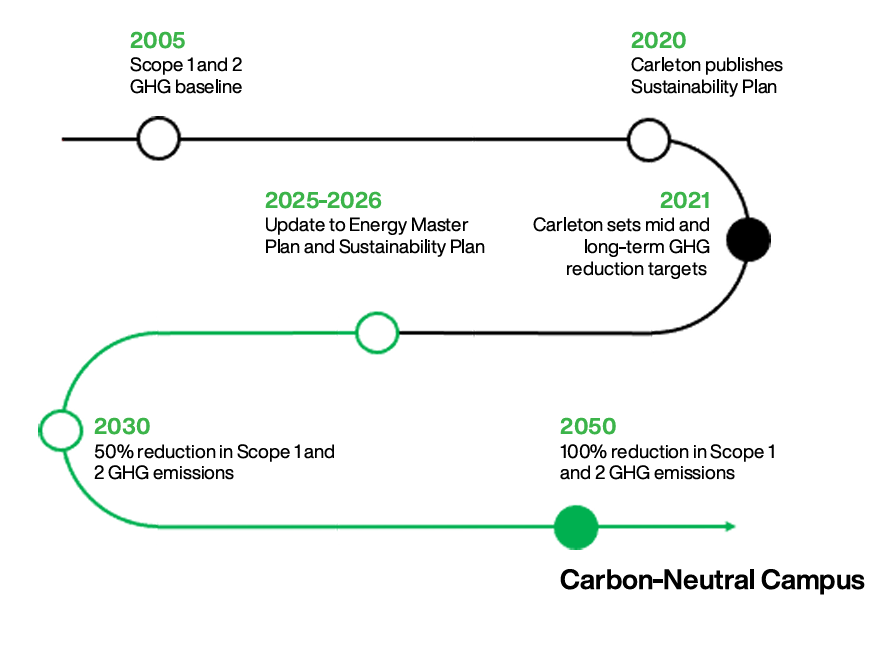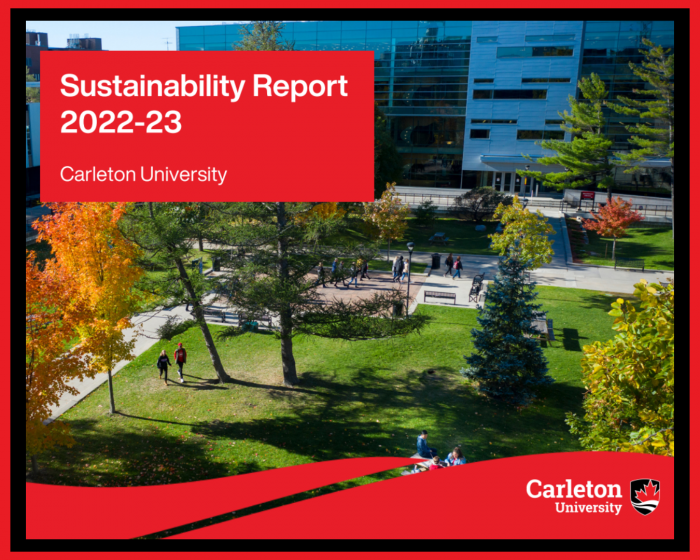Strive for Sustainability - Annual Report
The Sustainability Carleton Strive for Sustainability Annual Report provides an update on campus sustainability progress over the past 12 months, including key metrics and programs. We have highlighted some key parts of the report on this page.
You can also click the image on the right to view the full 2022-2023 report.
Recognition
- One of the first universities to sign up for the Government of Canada’s Net-Zero Challenge.
- Recognized in the Top 50 for the UI Green Metric global university rankings
- Recognized in the Times Higher Education Impact rankings for Sustainable Development Goal 12: Responsible Consumption and Production (50th) and Goal 14: Life Below Water (82nd)
- Became a founding member of the Nature Positive Universities program
- Achieved 3-Star Green Restaurant Certification
Initiatives
- Engaged the campus community in ‘Let’s Bike Ottawa Month’ programs to increase active transportation rates
- Developed first GHG emission inventory for Scopes 1, 2 and 3
- Completed a carbon footprint assessment of the listed equities of the Carleton Endowment and Operating Funds
- Completed energy projects and audits toward GHG reduction goals
- Rolled out additional internal and external four-sorter waste bins and completed three campus-wide waste audits

Pathway to Carbon-Neutral Programs
- Expand the current district energy infrastructure
- Review innovative generation, distribution, and delivery technology to lower environmental impacts
- Maximize renewable energy generation
- Develop programs for substantial gains in building and thermal efficiencies
 GREENHOUSE GAS EMISSIONS
GREENHOUSE GAS EMISSIONS
- Expanded GHG Scope 3 assessments, based on spend, for procurement and business travel.
- Completed an externally verified carbon footprint assessment on the listed equities of the Endowment.
- Incorporated utility consumption data for all university locations.
- Completed a GHG assessment for commuting travel, based on model share and campus population.
Scope 1 |
Scope 2 |
Scope 3 |
| 14.8% of total emissions, the majority coming from Natural Gas emissions | 1% of total emissions via purchased electricity | 84.2% of total emissions, with the most prominent being investments (71.9%) |
 ENERGY CONSUMPTION
ENERGY CONSUMPTION
- Lighting and HVAC upgrades contributed to a savings of 484,569 kWh and $58,149 in cost savings.
- In 2022, our total energy consumption increased by 23% from 2021, mainly due to increased on-campus populations and changes based on post-covid activity.
- Our percentage of electricity generated on campus increased by 11%, up to 15%.
 SUSTAINABLE TRAVEL
SUSTAINABLE TRAVEL
- Bird Canada E-Scooter pilot program saw a 200% increase in rides in the 2023 season.
- Carleton’s ‘Let’s Bike Ottawa’ team clocked up 5,487km and averted 1400kg of GHG emissions during bike month in June 2023. Additionally, free workshops and bike tune-ups were offered with over 100 staff members signing up for both.
- 61% of Carleton’s limited fleet (just over 100 vehicles) is electric, with continuous commitment to electrifying the fleet as vehicles need replacing
 COMMUNITY ENGAGEMENT
COMMUNITY ENGAGEMENT
- Biodiversity
- Additional bird-friendly glazing to buildings on campus. Currently there are 5 buildings on campus with the glazing. With community support, this glazing will also become standard for all new buildings and will be expanded to existing buildings to prevent bird deaths due to collisions.
- Carleton has also become a signatory of the Nature Positives Universities, which will allow for a review of the natural environment and our engagement towards wildlife on the campus.
- Campus Clean-Up
- Completed bi-annual ‘clean-up the campus’ events, engaging both staff and students to keep the campus litter-free.
- Sustainable Dining
- Carleton retained its Fair Trade Campus designation, which demonstrates promotion and awareness on the campus towards Fair Trade products.
- In addition, a revised steering committee was established with students (Engineers Without Borders), staff and faculty involvement.
- The university’s food service provider, Aramark Dining Services, purchased 25% of its food supplies from local and humane food sources in 2022.
- Dining Services also achieved Green Restaurant Certification and 3-Star SPE certification for the caf.
- Carleton retained its Fair Trade Campus designation, which demonstrates promotion and awareness on the campus towards Fair Trade products.
- Greening the Workplace
- We updated the Green Workplace Certification to include additional categories and updated scoring. There was increased promotion in early 2023 to all departments and individuals.
 SUSTAINABLE INVESTMENTS
SUSTAINABLE INVESTMENTS
- Alignment of the PRI principles to fund responsible investing practices.
- Established a fossil fuel-free fund to which donors may direct their gifts.
- A carbon footprint was completed on the listed equities of the Endowment.
- A 2030 carbon reduction target of 50% and net-zero GHG emissions by 2050 for listed equities was established.
- Continuing to not hold any direct fossil fuel investments.
- An inaugural Responsible Investing Report was completed for the combined Endowment and Operating Funds.
 SUSTAINABLE PROCUREMENT
SUSTAINABLE PROCUREMENT
- Increased promotion of the CUrb program where Carleton-owned goods are given or resold to other departments on campus, to encourage reuse. In the last year, six departments sold or gave away 45 items resulting in a $27k return of funds and 4,514lbs of wasted diverted.
- Carleton has also adopted accessible procurement considerations within our policy, formed an Advisory Group (APAG), and launched voluntary disclosure on the eShop and resources websites.
- The use of the Employee Purchase Program saw an increase in usage, in 2022, with five loans for employee bicycle and e-bike purchases.
- For public RFx: sustainable, accessible, and social criteria were considered on a case-by-case basis. In 2022, 14% of public Requests for Proposals included specific requirements or weighted criteria aligned with sustainable principles.
 ZERO-WASTE
ZERO-WASTE
- Carleton has completed multiple waste audits across the campus, including ones specific to food operations.
- These helped to determine the status of ongoing educational programs, specific areas of focus and better information for waste baseline data.
- Further increased the number of four-stream bins across campus and added additional bins outside in strategic locations, such as in front of Nideyinàn.
- Re-established specialized waste collection programs for textbook recycling, personal e-waste and batteries, and established a new stream for pen recycling.
- Zero-waste programs continue to be in operation at the residence food location, with reusable cutlery and service ware.
- Sustainability Carleton has also worked with property services to refine and develop the procedures around the collection of construction waste data.
- This will better help us to understand the full waste profile and improve overall campus diversion from landfill.
- Carleton will also be reporting on blue box material, as required by the new Ontario Blue Box Regulation that started in July 2023.
